Assalamualaikum,
Okay hari ni, aku nak review satu mod Warband. But this time it's not for Game of Thrones, but a historical mod. Asyik main fantasy mod je, so sekarang kita play some real-event mod pulak.
Baiklah, mod yang aku nak review hari ni ialah Aut Caesar Aut Nihil or simply known as ACAN. Mod ni was being developed by BG Maxi team initially pada tahun 2019. ACAN menggunakan Brytenwalda sebagai base game. Mod ni bertemakan zaman Empayar Rom ketika pemerintahan Maharaja Nero. Ni merupakan faction yang ada dalam mod ni.
Map memang besar. Merangkumi the entire benua Eropah dari Iberian peninsular (barat), ke North Africa (Selatan), Parthia (timur) dan Britannia (utara). Yang aku screenshot ni ialah the heart of Empire, Roma Italia iaitu semenanjung Itali yang menempatkan the capital, Rome.
Dalam map ni banyak visit-able point of interest yang labelled kaler putih. E.g: Cave of Dionysis macam kat gambar atas ni. Ada close to twenty interesting location yang kita boleh visit dan explore. Guess what, kita boleh cari hidden chest yang contained few valuable items such as weapon, armor etc. Macam aku setakat ni berjaya collect Silver Spear dan Julius Caesar's legendary Gladius.
Hero kita, Gaius Aurelianus melawat Stonehedge ketika mengiringi lawatan Emperor Nero ke Britannia.
Sempat menyinggah Temple of Zeus di Olympia. Religion memang main peranan dalam mod ni - character kita boleh pilih untuk menganut a few agama yang ada such as Christian and pagan god of Greek, Roman, Celt dan banyak lagi. For Aurelianus, he worshiped Jupiter Optimus Maximus, the Roman god of Sky and Thunder.
Dalam mod ni jugak kita ada ability untuk create latifundium yang berfungsi sebagai our own merchant center, farm dan juga temporary army camp. Kat sini kita boleh establish many farms and enterprises yang vital untuk trading. Latifundium ni yang aku nampak sesuai untuk player yang pacifist dan tak pursue glory through battles. Sama jugak, the more advance your latifundium lagi tinggi renown yang ada but lagi advance maknanya you guys need to own many slaves to work.
If you guys owned a fort or town, korang boleh create your own legion in barrack but with a price lah. Tak silap aku, nak commissioned new legion perlukan at least 90,000 gold. If korang tak cukup duit nak buat legion, korang still can commissioned a cohorts or auxiliary yang jauh lagi murah. Satu cohort dalam 28,000, while auxiliary around 18,000.
Elemen RTS didalam ACAN ni dapat dilihat melalui role karekter dalam faction yang dipilih. Mirip Total War, ACAN membolehkan party yang diketuai karekter untuk attack, defend, reinforce, besiege atau scout open world. Konsep RTS atau real time strategy dapat dilihat melalui tema game ini iaitu ketika zaman Empayar Rom. Watak, tempat dan event yang wujud didalam open world ialah berdasarkan real-life event yang triggered within the Empire at that time.
Mechanic game sama je, its role playing game. Dimana kita akan control satu character yang kita created before kita start our journey. For this review, I created my Roman character yang bernama Gaius Aurelianus. At the time of this review, beliau sudah pun holding the title of Legatus Legionis (general of the legion) dan juga Censor didalam Roman senate.
Kekuatan ACAN dapat dilihat melalui quest dan random event yang pelbagai. Tak silap aku, ada berbelas main quest yang player boleh explore. Every quest yang kita achieve, reward pun boleh tahan boek. Ada dapat coin, some dapat renown point, tak kurang jugak dapat special item depending on quest yang kita buat. Dengan quest, kita juga berpeluang visit banyak custom location such as Temple of Delphi, Hanging Garden of Babylon dan banyak lagi. Ini yang membuatkan ACAN ni ada peminatnya sendiri, quest with lore NPC dan juga customized scene etc.
Character report pun detail jugak. Kat sini boleh tengok our relation with lords and ladies of the realm, our love affiliation dan sebagainya. Ada jugak Empire report, boleh refer gambar bawah.
Senate memang main peranan dalam game ni. As a noble, kita pun boleh naik ranking dalam Curia Julia. From rank Tribune sampailah ke Censor. Macam dalam gambar ni, karekter aku ni dah sampai the highest rank, dan juga mendapat sokongan penuh dewan. Why support penting? Sebab end goal game ni ialah untuk menjadi Emperor of Rome, ada part dimana korang akan diberi satu quest triggered by Legatus Kaeso Flavius untuk overthrow Nero. Aku dah dapat quest tu, cuma tak nak buat lagi. Malaslah jadi Emperor, huu. Okay since aku takde intention nak create new miniseries, jom kita tengok sikit journey hero kita dalam mod ni.
In summer 60AD, Gaius was being lobbied by his father to join the Emperor's entourage to visit Imperial province of Britannia. A supposedly peaceful tour was later turns into a bloody conflict as the Briton tribes rose to rebel with intention to capture Nero.
An initial incident near Corinium, Gaius was forced to led an Imperial legion to defend Nero's camp after the death of its legatus which under attack by Ri Egan. After a long five hours of battle, the camp was secured and Gaius earned recognition by the Emperor. Shortly after his victory, he mobilized two legions (Imperial Legion and Legio IX Brittania) with direct consent from Nero to advance westward to chase the retreating tribes.
Due to his swift mobilization and cunning stratagem, Gaius managed to intercept Ri Egan and cut his line of retreat at Isca. The pitched battle was ended with Roman victory, followed by the capture of Moridonum in late 61AD. This triumph earned Gaius a new nickname - Destroyer of Demetae & Silures as both tribes submitted to Roman's authority shortly after their heavy defeat.
During his time at Britannia, he saved the life of Gwenhwyfar, a Celtic woman whom being accused practicing black magic. After spending a few months with her, Gaius married her in a modest ceremony at Londinium. The couple later hastily returned to Rome with Nero's entourage after the outbreak of war at the Eastern front, together with political instability in the capital.
62AD - With the expel of Marcelii clan due to their involvement to assassinate Nero in the same year, the island of Sicilia was being rewarded to Aurelii clan. After the death of his father, Gaius is now the current head of the clan. He shifted his seat to Siracusae to accommodate his role as Governor of Sicilia and begin to oversee the rehabilitation of the island with a numbers of decree and establishment of numerous latifundium to support the initiative.
In response to Parthian's incursion of Palmyra, Caesar Augustus Nero commissioned a fresh legion with newly promoted Legatus Gaius Aurelianus as the commanding officer. Legio XII Sicilia was being quickly dispatched to the front. Gaius left the administration of Sicilia to his brother, Septimus and departed to the East to join Legatus Augusti Flavius Vespasianus' army to relief Palmyra.
Parthian's reserve troops, around 2,000 men from Shah's Royal Guard retreated from the battlefield shortly after receiving news on the massacre of their countrymen in the hand of the Roman legion.
Legatus Gaius Aurelianus has scored an important victory against the Parthian. His mastery allowed the Roman marshal, Vespasianus to focused with his thrust to the Parthian's capital, Ctesiphon. Impressed with his generalship, Vespasianus handed command of additional three legions - Legio III, Legio XI and Legio V to Gaius in his bid to occupy southern Parthian land.
66AD - With a total strength 20,000 men, the young general proved his masterclass in scoring three successive victories and captured Susa and Persepolis in process with much smaller forces. Parthian's king, Shah I was forced to negotiate peace with Emperor Nero after suffering heavy defeat at all fronts. The war is over.
Shortly after the end of war, Gaius and a few Roman legatus took the opportunity to rest and visit the famous Hanging Garden of Babylon. Here, he made acquaintance with Legatus Kaeso Flavius, general of Praetorian Guard and uncovered a sinister plan of yet another assassination attempt on the Emperor. Gaius sensing the treasonous motive, ignored the plotter and chose to remained neutral.
67AD - at the Imperial Palace of Rome, Nero personally congratulate Gaius on his achievement and generously rewarded him with a title: Censor - a Roman magistrate position who responsible in maintaining census and govern the financial aspect of goverment. This title was proven the beginning of downfall for our hero.
Upon his return to Siracusae, Gaius Aurelianus received a warm welcome by his people. A small scale triumph was being organized by the town Quaestor, followed by a grand feast for a straight three-days. In addition, his statue was being erected to honor his contribution during the Roman-Parthian War. This caused dissatisfaction of several senators who are now plotting to diminish Gaius popularity among the plebs.

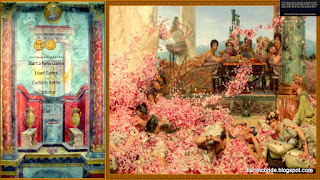
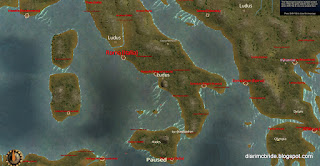

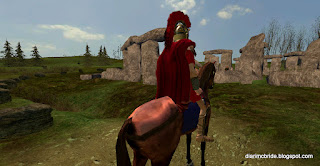
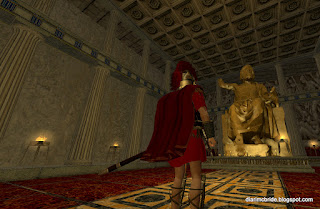
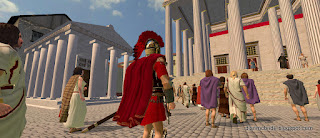







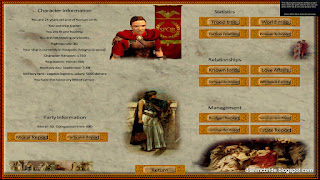



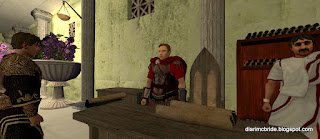

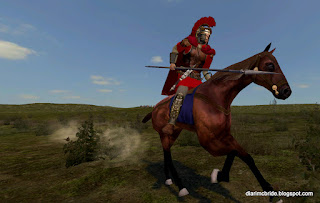














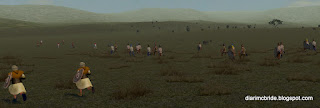

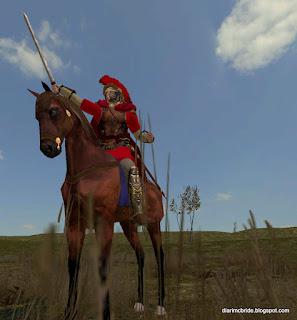



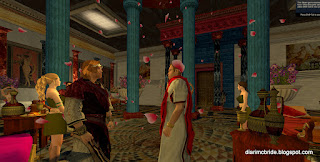
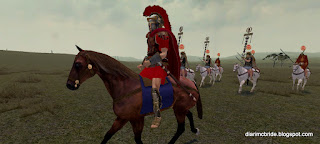




No comments:
Post a Comment